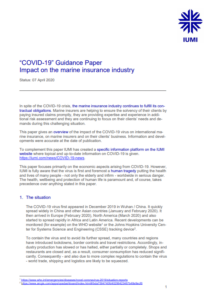IUMI published a guidance paper providing an overview of the impact of the COVID-19 pandemic on marine insurers and their clients’ business. The paper focuses on the microeconomic impact, the impact on marine and logistics, as well as on marine insurance industry.
The paper recaps the situation up to now, reminding that the virus was firstly reported in Wuhan, in late December 2019, and evolved to what is now declared as a global pandemic. In efforts of mitigating the spread of the virus, the shipping industry has already issued several guidelines and restrictions for the protection of those working in the sector; Yet, despite efforts, COVID-19 has led to 88,538 deaths up to today, April 9.
Concerning microeconomics and the future of shipping, IUMI notes that it is too early to assess the impact of the pandemic, as they expect to see how the situation will develop.
Yet, for the time being, the outcomes are currently being modelled based on different scenarios: Estimates for a potential shrinkage of global GDP vary between about 2% if the virus is fought successfully in spring 2020 or up to 20% if the virus continues to spread until autumn 2020.
Referring to how the supply and logistic chains cope with the pandemic, IUMI states that the impact is visible. In essence:
- Issues related to the safety and health of vessel crews and passengers are being reported frequently, with ICS issuing guidance for ship operators for the protection of the health of seafarers.
- Border restrictions have led to disruption in the supply chain; The National Retail Federation and Hackett Associates shows issued a report stating that imports at major US retail container ports dropped to their lowest level in five years in March.
- Certificates are being extended.
- Restrictions implemented to port calls or vessels are not allowed to enter ports, under published restrictions.
Thus, in addition to the above, IUMI highlights that
In the event of a major claim or a casualty, surveyors, salvage and other experts from abroad may not be able to attend. This means that local and coastal administrations will have to be flexible and realistic with regard to legal and policy stipulations and to check appropriate exemptions from the strict quarantine or other border restriction rules.
Marine insurers are fully committed to supporting their clients with their expertise and experience in these exceptional times, although the sector is also experiencing challenges through these times. Consequently, insurers are referring to potential claims scenarios that might arise, for example, in the following areas:
- For hull, there are likely to be delays, and problems with availability of personnel, both on-board vessels and in ports, either through illness or regulation. The availability of spare parts may also cause problems. Vessel lay-ups may occur and will have to be taken into account.
- For cargo, a decline in trade and transportation volumes generally means less business. Uncertainty and interruptions in the supply chain may lead to delay and business interruption. Warehouse overflow and congestion in port areas may cause additional losses.
- In many businesses such as the cruise industry, special business interruption policies or clauses may be affected.
- In some countries such as the US and the UK, policy makers have seemingly focused on business interruption claims and the fact that many of those insurance policies either contain pandemic exclusions and/or have not been specifically extended to provide COVID-19 related cover. There are some initial calls for mandatory retroactive cover despite specific exclusions. Such an approach would cause severe solvency issues and be potentially ruinous to the insurance market.
Overall, IUMI is providing additional information on IMO’s standpoint and actions during the pandemic, which you can find by clicking herebelow































































